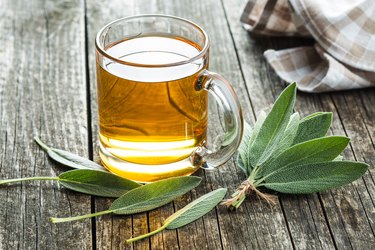
Sage tea may have an array of health benefits, but its efficacy for treating any specific condition is unproven. Preliminary research is all we have.
However, studies show that sage tea holds promise for improving cognition, relieving hot flashes and other potentially useful applications.
Tip
Health benefits of sage tea might include improved cognition, and the relief of hot flashes.
Video of the Day
What Is Sage?
Sage, Salvia officinalis or Salvia lavandulaefolia, was used for culinary and medicinal purposes in ancient Rome, Greece and Egypt, reports the National Center for Complementary and Integrative Health. Native Americans also have used it for healing and longevity.
Video of the Day
In modern times, people use sage for memory loss, sore throat, depression and digestive problems. Research on these and other benefits is limited and preliminary, so it hasn't provided clear support for the use of sage tea for any condition.
Sage is available as leaves, or as an extract in various forms. Cooks use sage to flavor stuffings, Italian pasta dishes and sausage, notes the University of Maryland Extension.
You may purchase ready-made sage tea, or prepare your own at home. To make it, bring 1 cup of water to a boil, and pour it over 1 tablespoon of sage leaves. Let it steep until it reaches the strength you prefer, and then strain out the leaves. If desired, you may add honey and lemon to enhance the flavor. Sage tea contains no caffeine.
Understanding the Benefits of Sage
Sage benefits for brain health were explored in a March 2017 study published in Drugs in R&D. After reviewing the body of research on the topic, the authors concluded that animal, test-tube and preliminary human studies indicate that sage consumption can improve cognition and help protect against neurodegenerative diseases such as Alzheimer's disease.
The authors of the Drugs in R&D study said that several mechanisms of action may underlie the use of sage for cognition. These include reducing inflammation and depression, as well as protecting against the harmful effects of the buildup of plaque in the brain.
In an April-June 2014 study published in the Journal of Traditional and Complementary Medicine, researchers reviewed investigations dealing with the health benefits of sage. The findings suggested that the herb might be of value for treating minor common illnesses, along with many serious illnesses such as diabetes, depression, dementia, obesity, heart disease, cancer and lupus.
According to the authors, clinicians should exercise caution until further research proves the safety and efficacy for using sage to treat these conditions.
The review in the Journal of Traditional and Complementary Medicine stated that sage has traditionally been used to treat sweating, hot flashes and other symptoms of menopause. A small 2009 clinical trial published in Planta Medica tested the efficacy of sage in treating menopausal hot flashes on 71 women.
Read More: How to Tone Up After Menopause
Although the study isn't current, it merits notice because it's likely the only clinical trial on the topic to date. The authors wrote that sage was effective and well-tolerated.
Side Effects of Sage Tea
While sage is generally considered safe, some species contain thujone, a substance that can have adverse effects on the nervous system, says the National Center for Complementary and Integrative Health. Consuming large amounts of sage leaf or oil, or using it for an extended period, can cause dizziness, restlessness, vomiting, rapid heartbeat, kidney damage, tremors and seizures.
Twelve drops of the oil is a toxic dose. Before starting on any herbal tea or supplement, check with your doctor first.
Authors of a July 2011 study published in the Chemistry Central Journal said that in addition to thujone, sage tea may also contain another contaminant — camphor. While the report isn't recent, it provides valuable information about sage tea's safety. The researchers measured sage teas to determine the amount people can drink without experiencing the toxic effects of the two substances. Results showed drinking 3 to 6 cups per day likely won't produce toxicity.
- National Center for Complementary and Integrative Health: "Sage"
- University of Maryland Extension: "Sage"
- Drugs in R&D: "Salvia (Sage): A Review of Its Potential Cognitive-Enhancing and Protective Effects"
- Journal of Traditional and Complementary Medicine: "Chemistry, Pharmacology, and Medicinal Property of Sage (Salvia) to Prevent and Cure Illnesses Such as Obesity, Diabetes, Depression, Dementia, Lupus, Autism, Heart Disease, and Cancer"
- Planta Medica: "A Multicentre Open Clinical Trial to Assess the Tolerability and Efficacy of Sage Tablets in Menopausal Patients With Hot Flushes"
- Chemistry Central Journal: "Determination of the Biologically Active Flavour Substances Thujone and Camphor in Foods and Medicines Containing Sage (Salvia Officinalis L.)"